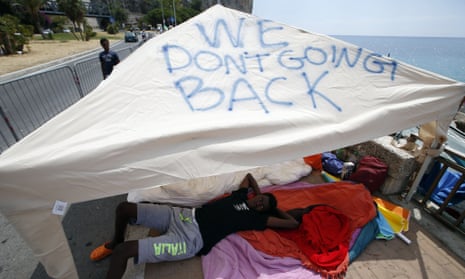More of Britain’s overseas aid budget should be used to discourage mass migration from Africa so that the UK does not have to “fish” refugees out of the Mediterranean, Michael Fallon, the defence secretary, has suggested.
The senior Conservative cabinet minister said the UK was currently only addressing the symptoms of the crisis and needed to work with European nations to “deal with the problems further back” in more than 20 countries people are attempting to leave.
“I think we can pool the intelligence we all have, get more information about the roots, and use overseas aid budget to help stabilise some of these countries and discourage mass migration from them. Well-focused aid should be used to help stabilise these countries, to prevent conflict, to discourage mass migration, so that we don’t have to fish people out of the Mediterranean later on,” he told the BBC’s Andrew Marr Show.
The UK government is under intense pressure over its response to the migrant crisis, with thousands having died this year in the Mediterranean Sea and around half a million expected to attempt the crossing this year. The Italians are also losing patience with the situation and have warned that they could issue rescued migrants taken to its shores with visas to travel throughout the Schengen area of Europe, which does not include the UK.
A government source suggested at the G7 summit earlier this month that David Cameron, the prime minister, could be looking at diverting some of the foreign aid budget towards the crisis. The source said: “One of the things we are looking at is whether we could be doing more at the source of the problem. That doesn’t only mean border security; it could be economic development.”
Cameron also indicated he thinks foreign aid is a major part of the answer as he spoke at a global security summit in Slovakia on Friday, saying he would push for Europe to help improve lives in north Africa and the Middle East.
Before a meeting of European leaders this week, Fallon also said part of the solution was for countries to attempt to disrupt trafficking routes “much further back in Africa” than the Libyan coast.
Asked whether the UK could push for a blockade of the north African coastline, the defence secretary said: “That’s a matter for Europe to see. It’s a very long coast, over 1,000 miles long. A blockade required 40 ships last time it was done three or four years ago. So that is a difficult operation.
“I think what’s more important is to pool intelligence we have, to go much further back in Africa, and establish the pattern of these trafficking routes and bear down on the criminal gangs that are organising this migration.”
He said the next phase of the operation was about “building up better intelligence of who these gangs are” as well as “encouraging a policy of return”.
“We know already that traffickers are ringing the Italian coastguard and telling them when the boats are setting off. So we need to get to grips with the operation itself and start to tackle the trafficking routes further back,” Fallon said.
The UK’s HMS Bulwark has saved more than 3,000 lives so far this year. The ship is being withdrawn for maintenance, and the government confirmed over the weekend that a much smaller vessel, HMS Enterprise, is being sent to replace it.
Over the weekend, Fallon also defended the government’s military strategy and spending in the face of criticism that the UK was at risk of declining as a power.
Accusing Russia’s president, Vladimir Putin, of “sabre-rattling”, he said the UK commitment to a new Nato rapid reaction force is to be extended by three years, with 1,000 troops sent next year and 3,000 in 2017.
Writing in the Sunday Telegraph, Fallon said: “No country in Europe is playing such a strong global role.”
He said the UK was “in it for the long term” when it came to Nato and deterring Russia, battling Islamic State, and humanitarian missions.
A big area of political contention is whether the UK will continue to spend 2% of its national income on defence, in line with its Nato commitment. Pressed on the issue on the Marr show, Fallon would not commit to the target for the rest of this parliament, echoing the position of both Cameron and George Osborne, the chancellor.
Fallon said he wanted to meet the target but did not actually commit to doing so.

Comments (…)
Sign in or create your Guardian account to join the discussion